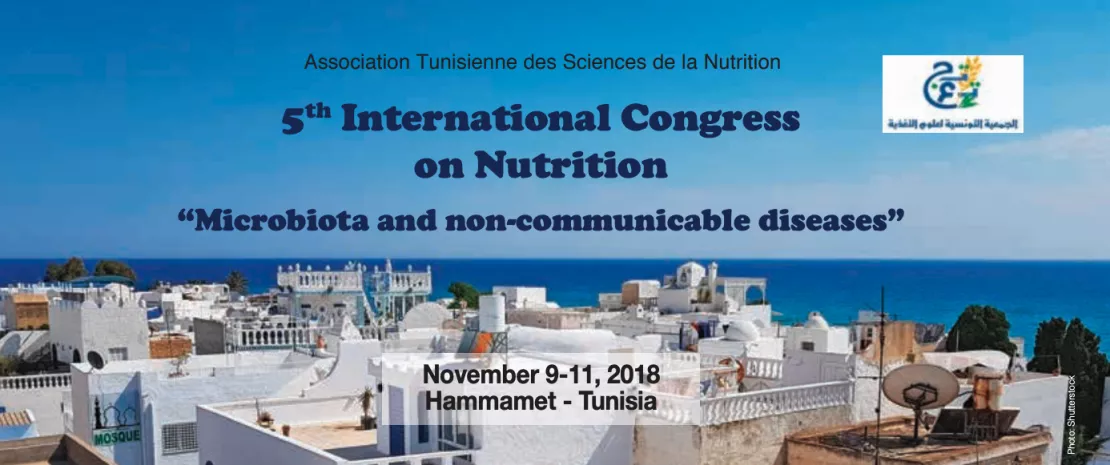The gut microbiota: issues and challenges in the management of metabolic disorders
Congress review
By Pr. Jaafar Heikel
African Centre for Health Research and Studies, Mohammed-VI University Polytechnique, Morocco
Lay public section
Find here your dedicated section
Sources
This article is based on scientific information
Sections

About this article
Author
The 5th International Congress on Nutrition, organized by the Tunisian Association of Nutrition Sciences, was held on November 9-11, 2018 in Hammamet, Tunisia. This edition sheds light on the link between the gut microbiota and metabolic disorders such as diabetes and obesity.
The microbiota: a new player in our understanding of metabolic disorders
Like most African countries, Maghreb countries are experiencing a demographic, epidemiological, and nutritional transition. In 2018, as in developed countries, there were more deaths from non-communicable diseases (75%) than from infectious diseases. Excess weight, obesity, diabetes, and hypertension have become a public health concern, with prevalence exceeding 50, 20, 10 and 30%, respectively. Classic approaches to management have proved to be inadequate due to a number of determinant factors.
Although the first published studies on gut microbiota date back to the 1960s, it has only been in the last fifteen years or so that new work has highlighted the role of the microbiota in the maintenance of chronic inflammatory states, insulin resistance, or obesity, by acting through different mechanisms.[1] Phenomena such as metabolic endotoxemia and bacterial translocation, resulting from the passage of lipopolysaccharides (LPS) into the systemic circulation, appear to be implicated.
Whether the disorder is diabetes, obesity, or metabolic syndrome, the quantity, quality, and diversity of microbiota (especially the phyla Firmicutes, Bacteroidetes, and Actinobacteria) underlie the cascade of responses leading to increased intestinal permeability (“leaky gut”), mobilization of pro-inflammatory cells, and induction of specific cell transport proteins. Gut micro-organisms are even thought to play a positive role in the immune system through exposure to bacterial LPS, which may be tolerated in some cases. Metabolic disorders, such as those caused by a high-fat diet, for example, could be avoidable by inhibiting LPS receptors (CD14/Toll-like receptor 4; TLR-4).
Bacteria-host cell communication: impact on metabolism
When subjected to a high-fat, low-fibre diet, the bacteria that compose the gut microbiota undergo changes on their surface (LPS) that trigger immune responses and local inflammatory reactions. These events increase intestinal permeability, allowing inflammatory components to enter the bloodstream.[2] Recent work has highlighted this role of dietary fat in dysbiosis and endotoxemia, initially in the oral microbiota. The process is thought to be triggered first by glycoprotein CD36 (increased sensitivity to the taste of fat), and then augmented at the level of the microbiota of the gustatory papillae (rich in Streptococci), thus creating a local inflammatory process identical to that seen in the intestinal wall. In addition, the texture and type of fat – saturated or polyunsaturated – and the involvement of bile salts have also been suggested as factors that could help account for metabolic disorders and the risk of obesity.
The role of certain bacterial phyla such as Firmicutes, Bacteroidetes, and Actinobacteria in metabolic endotoxemia, based on studies in both axenic mice and humans, is well established. For instance, in the mouse, a high-fat diet increases the concentration of circulating LPS, leading to metabolic changes linked to obesity, and analysis of gut microbiota reveals a significant decrease in Bifidobacterium spp. and Bacteroides-associated gut bacteria. In addition, a negative association has been observed between endotoxemia and the number of Bifidobacteria; the latter can reduce the level of LPS and improve intestinal barrier function,[3-5] as well as intestinal barrier integrity, which is crucial to prevent passage of bacterial components from the intestinal lumen into the bloodstream and host tissues.
What is the impact on management of metabolic disorders?
The major focus is currently the identification of specific bacteria, with a view to offering clinicians the tools to prevent or manage patients at risk of, or already suffering from, a metabolic disorder.[6- 7] Restoring equilibrium to the intestinal ecosystem or re-balancing the microbiota is a challenge in patients with intestinal dysbiosis, which is determined by epigenetics, the environment, diet, lifestyle, history of antibiotic treatments, and state of health.
Thus, Firmicutes and Bacteroidetes, which account for the majority of our gut microbiome, affect the risk of metabolic diseases, relative to their abundance. Moreover, recent studies on specific bacteria associated with energy and carbohydrate metabolism have been carried out in the laboratory. These studies seem to show, for example, that Akkermansia muciniphila, even pasteurized, improves intestinal barrier function and the thickness of the mucus layer, and may thus influence insulin resistance and obesity. The oxygen sensitivity of this species has so far limited its ability to be cultured and restricted its study in humans.
Other gut bacteria, such as Faecalibacterium prausnitzii, play a beneficial role and may offer therapeutic strategies based on the use of specific probiotics. In addition, other elements should be considered, such as the interactions between the host, microbiota, and brain, leading to the concepts of the taste cortex, pleasure circuit, and microbial agents that mediate obesity, which are of particular importance. The significant failure to manage obesity may be explained by approaches that lack optimal management of the dynamic states of the gut microbiota over time.
Consequently, today’s challenge is to better understand “obesogenic and diabetogenic microbiotic factors” in order to shape the way low-fat and low-carbohydrate nutritional diets, appropriate physical activity, probiotic and prebiotic supplementation, as well as faecal transplantation may be used in the future.
The role of these factors needs to be clarified with regards to their complementarity and based on an integrated preventative, but also therapeutic, approach.[8] Sufficiently large cohort studies should help confirm the role of the oral and gut microbiota in the development of transient and chronic inflammatory states underlying metabolic disorders – and probably other pathological states, such as cancers or some psychiatric conditions.






